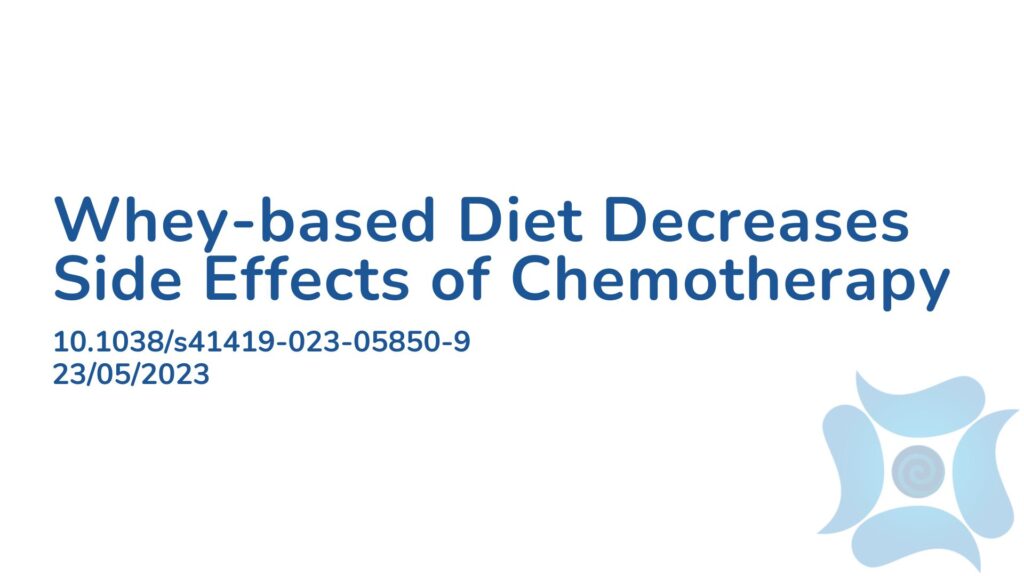Summary:
Chemotherapy continues to be the first line therapy for the majority of cancers, despite its harmful side effects which significantly harm the physical and mental wellbeing of patients. The gastrointestinal tract is highly impacted by the toxic nature of chemotherapy. Damage to DNA, inflammation and reduced nutrient absorption has all been documented in literature. Chemotherapy also impairs the gut microbiotas immune defenses. This paper looks at the efficacy of dietary intervention in protecting the intestinal mucosa during chemotherapy without impairing the anti-cancer effects of the drug. The test diet, which contained whey protein and medium chain triglycerides, was provided for 14 days prior to treatment. Methotrexate was used as the chemotherapeutic agent. The test diet showed significantly positive results as it reduced diarrhea, weight loss and increased daily activity. Moreover, the test diet increased diversity and resilience of the gut microbiota without impairing the efficacy of methotrexate against cancer cells. The authors therefore concluded that whey protein and medium chain triglycerides were effective at supporting the side effects of chemotherapy and improving quality of life.
Abstract:
Cytotoxicity (i.e. cell death) is the core mechanism by which chemotherapy induces its anti-cancer effects. Unfortunately, this same mechanism underpins the collateral damage it causes to healthy tissues. The gastrointestinal tract is highly susceptible to chemotherapy’s cytotoxicity, resulting in ulcerative lesions (termed gastrointestinal mucositis, GI-M) that impair the functional capacity of the gut leading to diarrhea, anorexia, malnutrition and weight loss, which negatively impact physical/psychological wellbeing and treatment adherence. Preventing these side effects has proven challenging given the overlapping mechanisms that dictate chemotherapy efficacy and toxicity. Here, we report on a novel dietary intervention that, due to its localized gastrointestinal effects, is able to protect the intestinal mucosal from unwanted toxicity without impairing the anti-tumor effects of chemotherapy. The test diet (containing extensively hydrolyzed whey protein and medium chain triglycerides (MCTs)), was investigated in both tumor-naïve and tumor-bearing models to evaluate its effect on GI-M and chemo-efficacy, respectively. In both models, methotrexate was used as the representative chemotherapeutic agent and the diet was provided ad libitum for 14 days prior to treatment. GI-M was measured using the validated biomarker plasma citrulline, and chemo-efficacy defined by tumor burden (cm3/g body weight). The test diet significantly attenuated GI-M (P = 0.03), with associated reductions in diarrhea (P < 0.0001), weight loss (P < 0.05), daily activity (P < 0.02) and maintenance of body composition (P < 0.02). Moreover, the test diet showed significant impact on gut microbiota by increasing diversity and resilience, whilst also altering microbial composition and function (indicated by cecal short and brained chain fatty acids). The test diet did not impair the efficacy of methotrexate against mammary adenocarcinoma (tumor) cells. In line with the first model, the test diet minimized intestinal injury (P = 0.001) and diarrhea (P < 0.0001). These data support translational initiatives to determine the clinical feasibility, utility and efficacy of this diet to improve chemotherapy treatment outcomes.
Article Publication Date: 23/05/2023
DOI: 10.1038/s41419-023-05850-9




